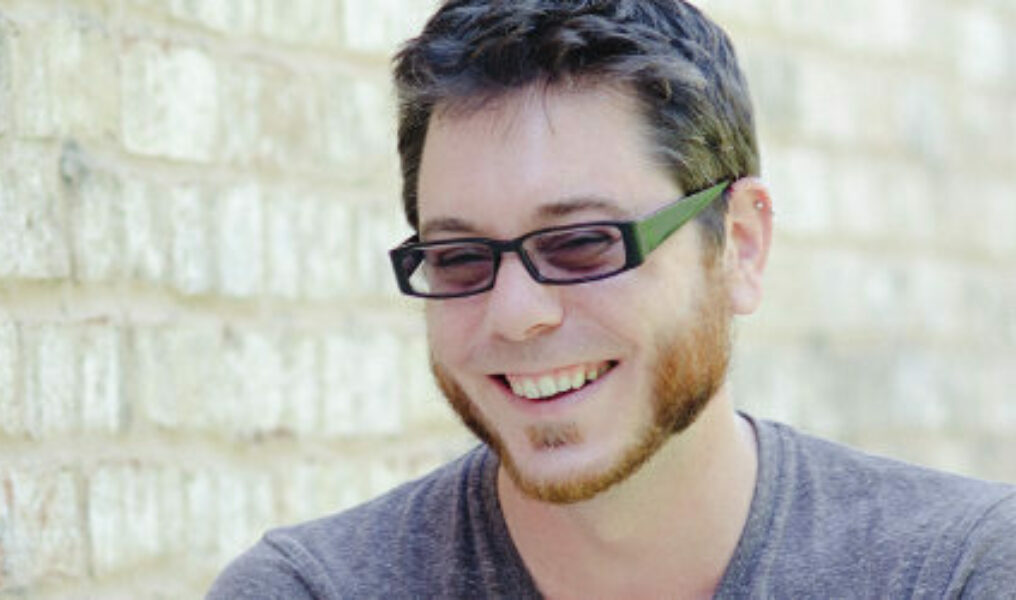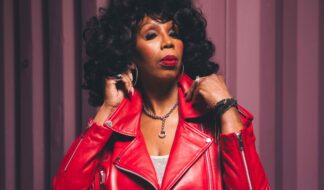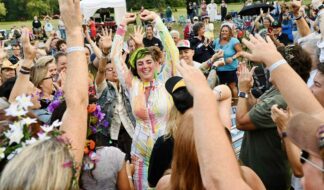By Gregg Shapiro

Jonathan Harper's debut short story collection "Daydreamers" is the kind of book that you'd hope it'd be: a fantastic introduction to a creative and original voice in fiction. The stories are populated with an arresting assortment of characters, including repo men, tattoo artists and suspension artists, role playing gamers, friends, family and those occupying the grey area between friendship and kinship. Throughout the stories is a pulsing undercurrent of sexual tension and dilemma that keeps the pages turning. BTL recently spoke with Harper about his writing, "the queering of the suburbs" and Gillian Anderson.
 Author Jonathan Harper reading at the official book release party at One More Page Books in Falls Church, Virginia in March 2015.
Author Jonathan Harper reading at the official book release party at One More Page Books in Falls Church, Virginia in March 2015. Congrats on the publication of your debut short story collection "Daydreamers"! What does the publication of the book mean to you?
I'm still in a state of disbelief. Actually, I'm terrified. I spent so much time loving the process of writing it: all the solitude, imaging the stories and then getting to live through them. The finished book was always a hypothetical, which may or may not get published. I realize now that I never really thought of this as a book others could interact with. Now that it's here, I have no idea what to expect. I just hope that if someone reads it, they find some sort of connection.
As a writer of short stories, do you have a favorite short story collection?
"Bad Behavior" by Mary Gaitskill. I bought a copy when I was 21 and it was the first book to make me hold my breath. I reread it every few years and even though my reaction to it has changed over time, I still feel empathy for her characters. I met her once at a reading. While getting my book signed, I called her "ma'am." She did not approve (laughs).
Who are some of your favorite short story writers?
My reading is scattered and I really admire a lot of different writers for different reasons. Just to name a few: Flannery O'Connor, Stephen Elliott, Angela Carter, Jameson Currier, Nuala Ni Chonchuir … the list goes on. I also slept with a copy of Jeff Mann's "The History of Barbed Wire" under my pillow for two months.

What was involved in the process of selecting stories for "Daydreamers"?
During grad school, one of my professors said that I wrote about people struggling between who they want to be and what the world will allow them to be. I was so touched by that. Beforehand, I kind of knew what I was trying to accomplish. I worked within these loosely defined themes of identity and isolation. There was a lot of sexual imagery and very passive characters who sort of let things happen to them. After that conversation, I became much more focused on what my characters actually wanted.
When I first started assembling this collection, it took me a long time to get organized. Before I could put together a table of contents, I ended up writing a lot of notes about the project as a whole. I knew I wanted to write about people struggling against their communities. I also wanted characters who daydreamed of being someone else or having extraordinary things happen to them. Then, the stories fell into place.
Were there more than these nine stories, and if so, do you foresee compiling the remaining stories into another collection?
Probably not. The majority of these stories were first written in my 20s and now I'm in my mid-30s. It's difficult to edit work that was inspired by a previous part of your life. The further away you get from your inspiration, the harder it becomes to rekindle with it. I don't want to say I lost touch with these pieces, but I kept wanting to rewrite them from a different perspective or in a different style, and the more you tinker with a story, the more you risk losing the original urgency. I'm not opposed to revisiting old work, but I'm ready for a clean slate.
Are there any characters in "Daydreamers" that you have continued to or plan to write about more?
I think the question I would have to ask myself is, "Do any of these characters have more room to grow?" A lot of "Daydreamers" is about stagnation. My protagonists generally cling to some idealist notion from childhood that prevents them from maturing. None of them get clean endings. They either realize they are at least partially responsible for their current situation or rationalize it away. To continue to tell their stories might not be worth it. Very few of them have achievable goals.
Is there a character or characters in any of the stories that are fictional representations of you? If so, which characters are closest to you?
The short answer is no. I don't want the burden of having to accurately portray myself in fiction. I want my characters to act in a way that's meaningful to the plot and sometimes that means keeping enough distance to remain objective. Settings and circumstances, however, are a completely different story.
I try to avoid making generalizations, but I do think a lot of fiction writers are reflected in their characters. We invent these people, give them personalities and names, and then throw them head-first into conflict. What they encounter is what the writer cares about – what frightens or intrigues us or what we obsess over. In my story "Nature," I put this very weak-willed boy, August, on the edge of his cousin's circle of friends. They're into BDSM and body modification. It's a community he doesn't belong in, which is what makes it so alluring for him. I may or may not have personal experience with this. There were at least a dozen drafts of this story. In some versions, August was emotionally destroyed and in others he thrived. I think we project part of ourselves on our characters. The more choices they have to make, the more consequences they suffer and the more we learn about ourselves.
You seem to know a lot about role-playing games in the story "No More Heroes." Are you writing from experience?
Oh dear (laughs). Yes, I am well acquainted with this subject matter. When I was young, I was definitely one of those kids who lived in his imagination long after it was encouraged. I read fantasy novels, watched anime and played D&D (Dungeons & Dragons). On top of that, people started figuring out I was queer, which made me an outsider amongst outsiders. I suffered a lot of rejection but also received a surprising amount of acceptance. It's funny how when I play now, I get this surge of child-like delight. But the next day, I get very self-conscious over it. There's a lot of shame built up from an awkward childhood.
This was a difficult story to write. It was fun to geek out on the page, but I worried people wouldn't take this subject matter seriously. You can't write a story about a game without showing it, but you don't want it to eclipse the actual characters, who are meant to be ridiculous but also fragile and hopefully sympathetic. For me, this story was about the friendships I had with straight boys growing up and what brought us together.
I was telling a friend about it and he mentioned Sam Lipsyte's story, "The Dungeon Master," that was published in The New Yorker. I rushed home and read it online. At first, I was horrified. Lipsyte's story was amazing and shameless and he beat me to the punch (laughs)! Our stories are very different, but they have similarities, and his is far superior. I almost abandoned mine, but then I felt inspired. Gaymers exist as well and I think we deserve stories too. This might be a topic I write about again in the future.
One of the things that stood out about the stories is that they are set in regions, the DC suburbs, for instance, that don't often find their way into LGBT fiction. What role does place play in your work?
I knew early on that I wanted to write about the queering of the suburbs. That doesn't mean I avoided other settings – I just wrote about what I knew. Most of my life, I've lived on the edge of a big city, looking in on it thinking, "That's where my people are." A lot of us viewed the suburbs as a temporary holding cell. Very few of us got out and made it into the big city.
The story "Costume Dramas" contains several references to Gillian Anderson. Where does she fall on your list of favorite actresses and what is your favorite Gillian Anderson role?
I really do like Gillian Anderson. My friend, Eileen, and I have been holding Period Piece Mondays for several years now and Gillian has been in several of our shows. She's a brilliant actress who does a lot of great work that I don't think she gets a lot of credit for. The one show I'm watching now is "The Fall" and it's just incredible and horrific. So, I figured, why not make a shout-out to someone I admire. Maybe she'll send an autographed photo! (Laughs)










